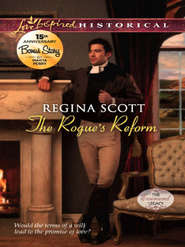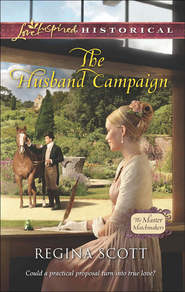По всем вопросам обращайтесь на: info@litportal.ru
(©) 2003-2025.
✖
The Rake's Redemption
Настройки чтения
Размер шрифта
Высота строк
Поля
She was so surprised she actually stopped, pulling him up short. The movement was enough for her mother to spy her and start in her direction.
“Cousin Vaughn,” Samantha Everard said behind them, her voice surprisingly hesitant for her usual confidence in the social scene. “You promised me the next dance. Have you forgotten?”
His body turned dutifully as he released Imogene, but his gaze remained on hers, waiting. She could almost see the hope.
“There you are, Imogene,” her mother said, coming up to her and taking her arm. “It’s been a long evening, dear, and I’d like to retire.”
Samantha Everard’s fingers were reaching for her cousin’s wrists even as Lady Widmore’s wrapped around her daughter’s. Before Imogene could answer him, they had parted, and she knew they would not be given the opportunity to talk again that night. She glanced at him twice as she walked with her mother to the door, but if he returned the look, she didn’t see it. Imogene felt a sigh of pure frustration escape her.
Her mother waited until they were seated in the carriage on the way home before requesting an explanation. How could Imogene refuse? Elisa Mayweather might be burdened with an overbearing mama, but Imogene knew how fortunate she was in her own mother. She hoped she’d look so lovely when she reached her mother’s age. Lady Lavinia Devary, Marchioness of Widmore, had hair that was a distinguished shade of silver, but her face was as unlined as Imogene’s, and she carried herself with an elegance her daughter envied. Even now, confronted with Imogene’s possible indiscretion, she was more concerned than censorious.
“Darling,” she said, reaching across the coach to take both of Imogene’s hands. “Why the interest in Mr. Everard? Surely you know his family is considered scandalous.”
Imogene frowned. “Are they? Why?”
Her mother’s voice was stern though her look remained concerned. “The former Lord Everard was not a gentleman, despite his title. I refused to allow him entrance to our home even though your father considered him a friend.”
Her mother was usually determined to see the best in everyone. Lord Everard must have done something terrible for her to take him in such dislike. But at least Mr. Everard had been right in calling her father and his uncle friends. “And do you find Mr. Everard so scandalous, as well? Is that why Father refuses to see him?”
Her mother squeezed her hands. “I have heard he has dueled, but I had nothing to do with your father’s decision. Still, I trust his judgment.”
“I wish I did. Something’s wrong, Mother. I can feel it.”
Her blue eyes were sad. “You are a loving daughter, Imogene, but you needn’t worry for him.”
Imogene leaned forward. “How can I not worry? He doesn’t talk to me anymore. He’s seldom home. It’s almost as bad as when Charles died.”
Her mother paled, as if even hearing the name of her lost son hurt. Imogene hurt with her.
“Your father is a very busy man,” she said, releasing Imogene’s hands, “called to serve the king in many areas. With Napoleon threatening to invade at any time, do you think something as small as a misguided poet could concern him?”
Imogene sighed. “Perhaps not, but he continues to refuse Mr. Everard entrance, even when he’s perfectly capable of receiving him. I’d like to know why.”
Her mother turned her gaze to the window. “There are a great many questions about this life that remain unanswered, Imogene. You would be wise to grow accustomed to the fact.”
She knew her mother was right. She’d never understood why her younger brother had died, why her mother had lost all the other older sisters Imogene might have had. She called Imogene her little gift from the Lord. Didn’t the fact that Imogene alone had survived and thrived mean God had some purpose for her life? Something more she was meant to do than simply dance through each Season with no thought but to her own pleasure?
I know You do, Lord! I know I was meant to save my family. Surely You have a greater plan than for all to be lost when Father dies someday. Show me the man You mean to help me gain approval to carry on the title of Marquess of Widmore!
* * *
She tried to ask her father about the problem as soon as they returned home, but Jenkins, their head footman, reported that he was still away. She hadn’t been willing to broach the subject with the marquess earlier without knowing a name. In truth, many people rapped at the door of the Marquess of Widmore: widows seeking redress from the War Office, or the Admiralty where he advised on French tactics, émigrés related to their French ancestors to request aid in rebuilding their lives in England, solicitors and land stewards needing decisions on the family investments.
Her father refused admittance to any number on a given day, depending on his plans and mood. Recently he’d been particularly difficult to pin down. He had little time for his family; he certainly had no time for strangers.
But Vaughn Everard was no longer a stranger. She had danced with him, walked with him, seen his dark eyes brighten in admiration. From his works she was certain he had a refinement of spirit that was nothing short of amazing. Why would her father have taken him in dislike?
She has missed her opportunity to find answers tonight, but that didn’t mean she had to give up. She hurried upstairs to her room, hoping for a few moments alone.
She and her mother shared a ladies’ maid, not because they couldn’t afford one for Imogene but because her mother insisted on it. Imogene thought her mother enjoyed whispering suggestions in the maid’s ear as to what gown would best suit Imogene for a particular occasion and how she should wear her hair. With Bryson busy helping her mother first, however, Imogene had time for a little more research on Vaughn Everard.
She started with Mr. Debrett’s The Correct Peerage of England, Scotland and Ireland. The two slim volumes listed every member of England’s most notable families. The Everard barony was one of the newer entries, unlike her father’s. He was the tenth Marquess of Widmore and likely to be the last, unless she succeeded in her plan. There were no male relations as far as anyone knew, and unlike the occasional barony and dukedom, marquessates could not be inherited by the female line. When her younger brother Peter Devary, Viscount Charles, had died a few years ago of a fever, her father had been even more devastated than Imogene and her mother, and Imogene knew that the inevitable end to their family name and heritage was part of his sorrow. If only she could find a suitor well-positioned enough to petition to have the title recreated in him!
But what was this? The book made no mention of Samantha Everard. According to it, Lord Arthur Everard had no issue. Imogene thumbed back to the title page and checked the date: 1802, only three years ago. Why hadn’t the publisher known about Lady Everard? She couldn’t be adopted—only heirs of the blood stood to inherit a title.
Imogene returned to the Everard page. It listed the heir presumptive as Jerome Everard, nephew of the late Lord Everard, with his brother Richard after him. And there—Imogene cradled the book and allowed her finger to linger on the name—was Vaughn Everard, with no wife noted. His father had been the third son of the first Baron Everard and the brother of the second.
That made him first cousin to Samantha Everard. Although it was not unheard of for first cousins to marry, particularly to keep a title or fortune in the family, it was still an uncommon practice. And with every gentleman in London gathered around her, Lady Everard had her pick of suitors. Surely she could spare her cousin.
Imogene heard the door open quietly behind her and set the book back on the shelf, wondering why she felt guilty. Bryson paused only long enough to curtsy respectively, then hurried to do her duty. The maid had raven hair held tightly back from her face and a long pointed nose. She chose to keep only the darkest dresses her mistress offered. When Imogene was little, she had once drawn Bryson as a raven.
Now the maid went to shutter the windows on either side of Imogene’s bed, her dress solemn against the soft blues of the room. She had closed the shutter on one side, each movement sharp and precise, when something rattled against the glass, and she recoiled.
“What is it?” Imogene asked, moving closer.
The maid turned to her, wide-eyed. “There’s a gentleman down in the garden. He seems to be throwing rocks!”
A gentleman? Who would be able to slip past the carriage house and stables, to avoid the notice of the footmen and butler? Frowning, Imogene ventured toward the window until she could peer down into the small garden below. In the light spilling from the windows above, she could see the carefully clipped hedges, the wrought-iron benches near the flowers, the stone-lined path to the stables beyond.
Someone was standing there, face turned up to her window, black cloak swirling around him like smoke from a blaze. Fingers shaking, she raised the sash.
“But, soft! What light through yonder window breaks?” Vaughn Everard called up. “It is the east, and Lady Imogene is the sun. Arise, fair sun, and kill the envious moon, who is already sick and pale with grief that thou, her maid, art far more fair than she.”
“I’ll fetch Jenkins,” Bryson said, backing from the window.
Imogene caught her arm. “Stay a moment. We’re in no danger.” As her maid frowned at her, Imogene called back. “Really, Mr. Everard, you resort to the Bard? I thought you were a man of inspiration.”
He swept her a bow, one arm wide. “I divined your room correctly, didn’t I? But alas, your beauty halts my tongue. My words could only be cursed as praise too faint.”
“A likely story,” Imogene said. “I do believe, sir, that you are lazy. You think to win me over with words alone.”
Straightening, he pressed his hand against his chest. “You wound me, my lady. Tell me what I must do to prove myself.”
“Go ahead,” she whispered to Bryson, who fled the room as if Imogene had put a brand to her skirts. To Vaughn she said, “Present yourself to the front door tomorrow at two, sir.”
He dropped his hand. “Alas, a dragon guards your bower, fair maiden. I have been refused entrance too many times, as I think you know.”
“And you, sir, pride yourself on your swordsmanship, I hear. Surely a dragon is no match for you.”
She thought he smiled. “Swords are messy. A whispered word from you might do the trick.”
Below, she heard the kitchen door open, saw a brighter light cut across his figure along with the shadows of Jenkins and one of the under footmen as they marched toward him.
“Consider yourself invited, Mr. Everard,” she called. “I shall expect you tomorrow at two. Do not be late.”
“I shall fly to your side,” he promised. With a swirl of his cape, he dashed off into the night, the staff right behind.
Imogene set down the sash and leaned against the glass, her breath quickly fogging the pane. Vaughn Everard was coming to call on her tomorrow. This time she intended to make sure he was allowed entrance, if she had to take on her father herself.











